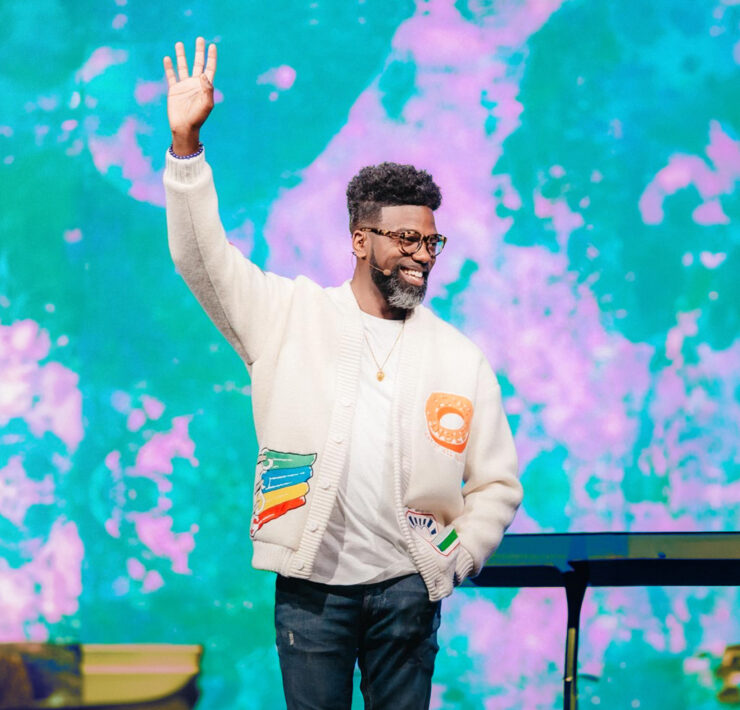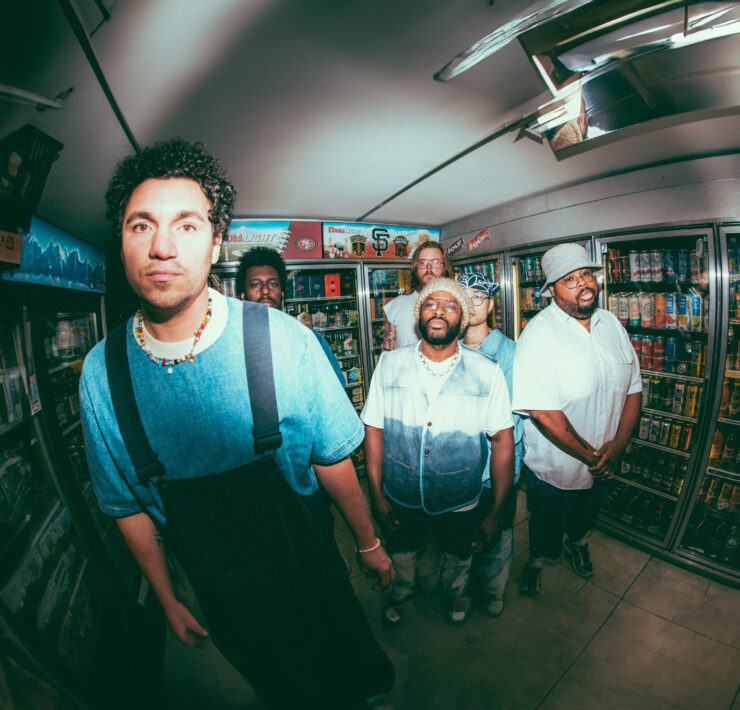John Darnielle tells me he’s reeling from his latest booster shot, but he doesn’t sound like it. He’s sharp and loquacious, thoughtful and funny. As the lead singer and songwriter of the Mountain Goats, he’s spent decades building up a reputation as a storyteller, peopling his songs with characters plucked from pulpy detective stories, southern gothic fables, grimy mosh pits, biblical yarns and, as often as not, his own life.
He’s the same way in conversation, illustrating his points with stories and sometimes just breaking off into one for the fun of it. If the booster shot has slowed him down at all, it doesn’t show. He feels strongly about the importance of staying vigilant about Covid protocols, despite the cultural pressure to move on. He frames it as a tension between Americans thinking in terms of “individual rights” instead of “individual responsibilities.” By his reckoning, many of us are more interested in exercising our right to do what we want instead of our responsibility to protect each other. He says it’s a type of thinking that may be deeply American but is not necessarily human.
“I would say that responsibility is actually the more natural impulse,” he says. “It’s one that we daily get reconditioned out of us. Ayn Rand was big on the notion that the natural human condition is one of self-interest. I just don’t think it’s true. I think that’s a consequence of the way we have wound up living.”
Darnielle thinks a lot about the things we owe to each other and how we can resist the pull towards selfishness and egocentrism. He says he feels strongly that “the notion that self-interest is the first and most important principle” is a false idea.
One of the band’s most famous songs “This Year,” is a tribute to human defiance in the face of hardship, with its climactic “I am gonna make it through this year if it kills me” singalong anthem. You’ve heard it, right? It became a huge deal on Tiktok, especially during some of 2020’s lowest points. Listening to Darnielle now, it sounds like it’s not enough for him to make it through this year. We all have to do it together, and that’s going to take relearning a few ideas we have about survival.
Microchoices
There’s an idea from C.S. Lewis — Darnielle can’t remember if it’s in Screwtape Letters or Mere Christianity — about the strange ways the choices we make end up shaping who we are.
“If you make the big choice to murder someone, that may or may not tell me much about you,” he says. “It might have been a bad time in your life. You might have been on a lot of drugs. You might have been defending yourself. You wind up committing murder. That’s terrible.”
Those are the sorts of big decisions that we often use to define people. If you murder someone, you’re a murderer. If you develop a drinking problem, you’re an alcoholic. But Darnielle says he’s getting more interested in the small choices — the ones we rarely think of as defining moments in our lives.
“If you, every day, choose to be a little petty; if you, every day, deny somebody a little help that you could give at no real cost to yourself, you are going to become a much worse person than the guy who murdered somebody one time. By the time you’re 50, you’re going to be an unpleasant person to be around.”
As an example, he says he’s been surprised at his own profanity lately, cursing a blue streak over things like a stubbed toe. That’s not a big deal, he freely acknowledges. Just a few extra naughty words here and there. But it’s also exactly the sort of small choices he’s talking about. He compares it to politics too, where minor partisan disagreements become excuses for polemic hatred.
“Anybody who they don’t like is a pedophile,” he says. “Anybody they don’t like is a Communist (whether Communist is an insult or not is another question). Calling everybody the worst thing you can think of. What’s left of you after you’ve been that person for a little while isn’t going to really resemble anybody who can be constructive in any way for themselves or others.”
These are the sorts of “microchoices” that are shaping us and, in turn, shaping our whole society.
Different Angles
You hear these ideas pop up on Mountain Goats songs, albeit in roundabout ways. The latest album is Bleed Out, written in the style of 1970s action movies with fast cars, ill-fated heists and a date with the business end of a bullet. It’s a thrill ride of an album, but Darnielle pushes back on the idea that it’s not saying something important.
“Any text, if you read a little bit, you say, ‘Where’s this text coming from? How does the narrator think and what does the author think of the narrator?’” he says. “With Mountain Goats stuff, what does the narrator think? And what does John think of the narrator? These are important questions.”
Darnielle populates his songs with a variety of narrators, calling to mind older songwriting traditions from the likes of Bob Dylan and Johnny Cash. And true to those legacies, just because a person is the main character doesn’t necessarily mean they’re the hero. Savvy listeners will pick up on how Darnielle feels about the characters he creates who sing these songs. He doesn’t want it to ever get too preachy, but he’s aware that he’s bringing an angle.
And that reminds him of a story.
It involves his father, who was teaching English literature to agriculture majors at Cal Poly in San Luis Obispo, a required course that, according to Darnielle’s memory, interested none of the students. As part of the course, his father had the students read Edna St. Vincent Millay’s “Love Is Not All” — a poem about the centrality of love to life itself, more important than food and shelter. He had the class write an analysis, and one response particularly bugged him.
“[My dad] got back one response that said, ‘The author has neglected to mention the love that’s actually important, which is the love of our savior Jesus Christ,’” he chuckles.
“Well, my father was morally outraged by this,” Darnielle says. “Because he was Christian. He felt like, how dare you? This is a good poem and I’m plenty Christian for life.” Darnielle’s father would go on to assign John Dunne’s “Batter My Heart, Three-Personed God” — a more explicitly Christian text — as a way of demonstrating that both poems were about the same thing, from different angles.
Bled Out
“You’re aware that I’m literally the biggest Amy Grant fan alive, right?”
Darnielle says he’s an “apologist” for Contemporary Christian Music and starts listing off CCM acts that he loves, mixing in a few deep cuts. He says seeing Grant live was “one of the most important concerts I’ve ever seen,” and also loves Carolyn Arends (“very fond of her”), Sarah Groves (“absolutely incredible”) and saves his greatest praise for Rich Mullins.
“I consider Rich Mullins absolutely as good as it gets,” he says. “When I’m trying to write songs, I’m thinking about Rich. If you can’t grasp that those are great songs, then you have a problem with your listening.”
It occurs to me that these artists are sort of acting as the Donne to his Millay, singing their “Batter My Heart, Three-Personed God” contemporary adult pop to his “Love Is Not All” indie folk — writing about God from different angles. Darnielle might dispute this comparison, not least because the Mountain Goats have written plenty of explicitly Christian songs. But there is something to the types of songs that the Mountain Goats write, and how they feel like a branch of the same tree that includes artists like Amy Grant and Rich Mullins — in the CCM sphere if not of it. It’s another angle.
But Darnielle is cautious about shifting too many genres. “Not every artist can just laterally go from comedy to tragedy, or protest song to ballad,” he says. “All this stuff, what you study, what you train yourself to do is what you’re good at.”
This is another one of those microchoices — a decision about what kind of artist you’re going to be. He likes heavy metal music, but he’s not interested in making any because “that’s not what my training is in.” Likewise, though he’s written several acclaimed novels, he says he’s not interested in writing comics despite his interest in them because “I feel like I would then be elbowing other people out of the way.”
It’s a testament to his conviction that choosing who you’re going to be is serious business, and not something to be taken lightly. If that sounds a little daunting, then maybe you’re getting the idea. But that’s the thing, isn’t it? These little choices aren’t so little at all. They are the little moments that make up our days. Taken in a large group, you just call them “life.”
“And these are the sorts of choices I’m talking about,” he says. “These choices that you make daily then shape your responses in the moment, if you should find yourself confronted with a moment of ethical or moral responsibility, which we seldom do on a daily basis. On a daily basis, our choices are to make food, to take care of the people closest to us, how we talk to them, how we listen to them, making little choices like that.
“The little choices are what wind up making a more radical world.”

























